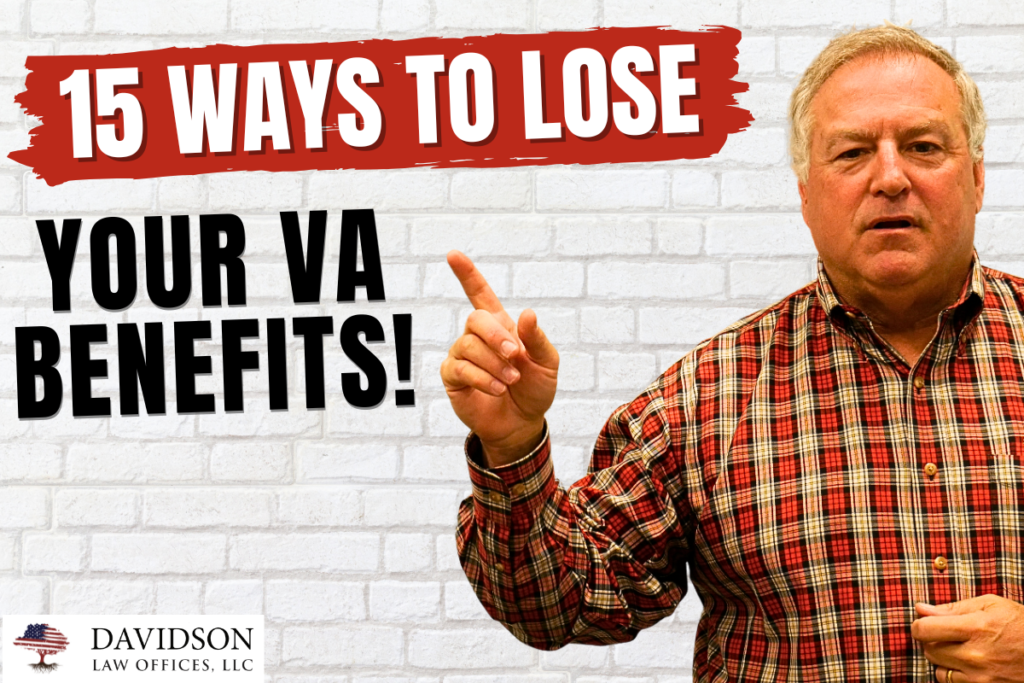Back in December 2022, I released a video titled Five Ways to Lose Your VA Benefits—Don’t Do This. Now, despite the title, I actually included a bonus sixth way to have your VA benefits reduced. That video received a lot of positive feedback, so I thought I’d revisit this topic and expand on it with even more ways you could lose or have your VA benefits reduced.
Let’s quickly recap the first six ways to have your VA benefits reduced that I originally covered:
- Waiting too long to file – Delaying your claim can result in lost benefits.
- Incomplete diagnosis or treatment history – The VA needs a full picture of your condition.
- Not showing a clear service connection – You need that all-important nexus.
- Neglecting to file for priority review – This can delay your claim unnecessarily.
- Not claiming unemployability as a result of disability – If you can’t work due to your service-connected disability, you need to claim it.
- Dishonorable discharge – This can result in complete forfeiture of your benefits. However, some discharges can be appealed or upgraded.
Now, let’s move on to even more ways to have your VA benefits reduced:
7. Fraud or Misrepresentation
This is a big one. If you knowingly make false or fraudulent statements regarding your VA claim, you’re putting your benefits in jeopardy. The VA can terminate all benefits, seek repayment, and even bring criminal charges against you. The process involves a formal review by the Regional Council, and the VA must provide written notice before taking any action. The bottom line? Always be honest when dealing with the VA.
8. Incarceration
If a veteran is incarcerated for more than 60 days after being convicted of a felony, VA benefits are typically reduced. Disability compensation is usually dropped to just 10% if you’re rated at 20% or higher. VA pension benefits are completely suspended during incarceration, and healthcare benefits become limited. If you find yourself in this situation, getting legal assistance to reinstate benefits once released is crucial.
9. Failure to Update Income for VA Pension
If you receive VA Pension or Aid and Attendance benefits, you must inform the VA of any income changes. The VA tracks income but doesn’t always track unreimbursed medical expenses, which could offset increases. If your income goes up, make sure to review your medical expenses so you don’t have your VA benefits reduced.
10. Not Receiving Regular Medical Re-Exams
Some service-connected disabilities require periodic re-evaluations. If you fail to attend these exams or if the VA determines your condition has significantly improved, you could have your VA benefits reduced or terminated. Always attend your Compensation & Pension (C&P) exams, and if the VA claims your condition has improved, seek a second opinion.
11. Non-Compliance with the VR&E Program
The Vocational Rehab and Employment (VR&E) program helps disabled veterans get job training and education. However, if you don’t actively participate or follow program guidelines, the VA can suspend or terminate your participation. Staying compliant ensures you continue receiving the benefits of the program.
12. Extended Travel or Living Abroad
If you leave the U.S. for an extended period, particularly over six months to a year, it could affect your VA pension benefits. Short trips generally won’t impact you, but prolonged stays might. Always check with the VA before making long-term travel plans.
13. Death of the Veteran
VA benefits belong to the veteran and do not automatically transfer to a surviving spouse. However, benefits like Dependency and Indemnity Compensation (DIC) or Survivor Pension may be available, but they require a separate application process. If the veteran had VA Pension, the surviving spouse may need to reapply for benefits at a reduced rate.
14. Changes in Dependency Status
Certain benefits, like dependent benefits and Aid & Attendance, are tied to marital status and dependents. Divorce, remarriage, or a dependent aging out of eligibility (turning 18 and not in school) must be reported to the VA to avoid overpayment issues.
15. Receiving Conflicting Benefits
If you’re receiving other federal benefits, such as military retirement or workers’ compensation, you could have your VA benefits reduced due to legal restrictions. This is often referred to as “double-dipping,” and while some benefits can be waived or adjusted, failing to report additional income sources could result in overpayments that must be repaid.
Final Thoughts
While most veterans retain their benefits for life, staying informed about VA regulations and keeping your records updated can prevent unnecessary loss or suspension of benefits. If you’re at risk of losing your benefits, don’t hesitate to seek legal assistance or representation to appeal decisions and correct any issues.
Contact Us for Help!
If you need assistance with Veterans benefits, complete this form or give us a call at (229) 226-8183. If you’d like to see this blog in video format, you can watch it below. Please be sure to SUBSCRIBE to our YouTube channel and click the bell notification button so that you’re notified each time we publish a new video.

